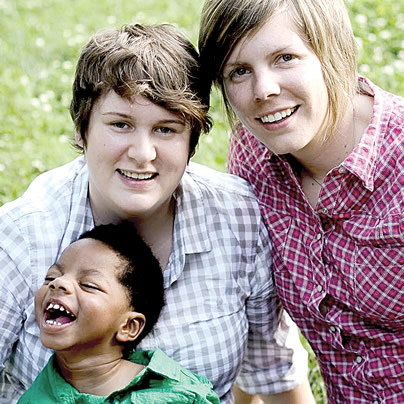National
‘It’s just an act of meanness’
N.C. couples brace for May vote on sweeping marriage ban


Shana Carignan (left) and Megan Parker Carignan with their son Jax. The North Carolina couple fears a proposed constitutional amendment would cost them crucial domestic partner benefits they need to care for their child. (Courtesy Photo)
For Shana Carignan and Megan Parker Carignan, the passage of Amendment 1 in North Carolina would mean much more than a dashed dream of walking down the aisle.
The Greensboro, N.C., couple faces the prospect of losing crucial domestic partner benefits they need to care for Jax, a four-year-old special needs child they adopted, as well as for Mary, a special needs elderly woman they’ve taken care of for about seven years.
Shana said “a lot of things are at stake” if Amendment 1 passes because her custody of Jax could be jeopardized if something should happen to Megan, who legally adopted the child.
“There’s a good chance that I would not be in custody of him,” Shana said. “Even if we were to draw up guardianship papers, they’re saying that there’s risk that this amendment would null and void it and that he would probably go back into the foster care system in Texas.”
Noting Jax has special needs, Shana said she doesn’t believe many other families would be able to care for the child should he be sent back to Texas.
Moreover, Amendment 1 would also cause problems if Shana were injured or died because Jax wouldn’t receive any benefits as a result that would be afforded to children under the care of their biological parents.
Also at stake is the couple’s home. The house in which the two reside is currently in Megan’s name. Even though both have contributed income toward the household, Shana could lose the home if something should happen to Megan.
“Even if she put me in her will, there’s a good chance that the courts would not give me anything that we worked toward together because we’re not married and because we’re not blood related,” Shana said.
At first blush, the result of the vote on the anti-gay amendment may seem neutral because same-sex marriage is already prohibited by statute in North Carolina. If Amendment 1 passes on May 8, same-sex couples won’t be able to marry. If Amendment 1 fails on May 8, same-sex couples won’t be able to marry.
But the sweeping measure would not only enshrine in the state constitution a ban on their ability to marry, but would take away domestic partner health benefits and make contractual agreements questionable at best.
The amendment reads, “Marriage between one man and one woman is the only domestic legal union that shall be valid or recognized in this state.” Opponents of the measure say anyone who falls outside of this definition could potentially be harmed by the amendment.
Jeremy Kennedy, campaign manager for the Coalition to Protect All NC Families, emphasized that Amendment 1 would have “far-reaching, negative consequences” that would go beyond a ban on same-sex marriage if it were passed.
“If the national industries pushing Amendment One intended to simply codify existing state laws banning same-sex marriage, they’ve made an egregious mistake, and in doing so impacted our state’s most vulnerable North Carolina families,” Kennedy said. “In addition to banning civil unions and domestic partnerships, Amendment One’s broad language could take health care away from children, put domestic violence laws in jeopardy, force seniors to choose between their hard-earned benefits and legal protections, and, in doing so, threaten all unmarried couples in North Carolina.”
Both Shana, 29, a fundraiser a local HIV non-profit, and Megan, 33, a caregiver for individuals with special needs, expressed frustration over the prospects of losing the benefits they need to protect their family if North Carolina voters approve Amendment 1 next month.
Shana said she’s “appalled” that her rights that many other couples may take for granted will come up to a vote. The couple had a commitment ceremony two years ago, but haven’t been legally married.
“I work a job, I pay my taxes, I have been raising a family,” Shana said. “We’re raising a family that’s non traditional that maybe a lot of people wouldn’t choose, or wouldn’t want to put in the amount of work that we put into our family because of the circumstances involving the disabilities. It’s already hard for us, and to make it that much harder is hurtful and just shocking.”
Megan echoed the sentiments expressed by her partner.
“We work so hard and I think if you look at our character, we just try so hard to be the best people and citizens that we can be,” Meghan said. “I love where I’m from so much, and just to think that there’s a potential that the state constitution could be amended to exclude me from so many things is frustrating and disheartening.”
Another couple that resides in Durham, N.C., Libby and Melissa Hodges, also expressed frustration over Amendment 1 because its passage would mean they would lose their domestic partner benefits. Both work as city planners and have a four-year-old daughter.
Libby, 32, said she receives domestic partner benefits from her job because that’s the most inexpensive way to care for Melissa, 33, and their daughter, but these benefits would become unavailable if Amendment 1 passes.
“Currently, the city I work for has domestic partner benefits and I cover [our daughter] under that insurance,” Libby said. “If the amendment passes, there stands to be a very good chance that she’ll not be able to covered under my insurance any longer.”
The couple also expressed concern about the consequences in the event the two decided to split. Melissa, the biological mother of their daughter, would have no obligation to provide visitation rights, nor would Libby have any obligation to provide any care.
“I see the signs out for the amendment,” Melissa said. “I feel like it’s just an act of meanness. I don’t see where it benefits anyone; it’s just trying to strike out and hurt me more. Related to my relationship I have very few rights as it is, and they’re striking out to take the few that we have away.”
A survey by Public Policy Polling last month revealed 58 percent of likely voters intend to vote for the amendment, while 38 percent were planning a “no” vote.
However, supporters don’t seem to fully understand the bill’s potential consequences. For example, 51 percent said they support some kind of legal recognition for gay and lesbian couples — either marriage or a civil union — yet 34 percent of that same group still intend to vote for the amendment.
Federal Government
Lambda Legal praises Biden-Harris administration’s finalized Title IX regulations
New rules to take effect Aug. 1

The Biden-Harris administration’s revised Title IX policy “protects LGBTQ+ students from discrimination and other abuse,” Lambda Legal said in a statement praising the U.S. Department of Education’s issuance of the final rule on Friday.
Slated to take effect on Aug. 1, the new regulations constitute an expansion of the 1972 Title IX civil rights law, which prohibits sex-based discrimination in education programs that receive federal funding.
Pursuant to the U.S. Supreme Court’s ruling in the landmark 2020 Bostock v. Clayton County case, the department’s revised policy clarifies that discrimination on the basis of sexual orientation and gender identity constitutes sex-based discrimination as defined under the law.
“These regulations make it crystal clear that everyone can access schools that are safe, welcoming and that respect their rights,” Education Secretary Miguel Cardona said during a call with reporters on Thursday.
While the new rule does not provide guidance on whether schools must allow transgender students to play on sports teams corresponding with their gender identity to comply with Title IX, the question is addressed in a separate rule proposed by the agency in April.
The administration’s new policy also reverses some Trump-era Title IX rules governing how schools must respond to reports of sexual harassment and sexual assault, which were widely seen as imbalanced in favor of the accused.
Jennifer Klein, the director of the White House Gender Policy Council, said during Thursday’s call that the department sought to strike a balance with respect to these issues, “reaffirming our longstanding commitment to fundamental fairness.”
“We applaud the Biden administration’s action to rescind the legally unsound, cruel, and dangerous sexual harassment and assault rule of the previous administration,” Lambda Legal Nonbinary and Transgender Rights Project Director Sasha Buchert said in the group’s statement on Friday.
“Today’s rule instead appropriately underscores that Title IX’s civil rights protections clearly cover LGBTQ+ students, as well as survivors and pregnant and parenting students across race and gender identity,” she said. “Schools must be places where students can learn and thrive free of harassment, discrimination, and other abuse.”
Michigan
Mich. Democrats spar over LGBTQ-inclusive hate crimes law
Lawmakers disagree on just what kind of statute to pass

Michigan could soon become the latest state to pass an LGBTQ-inclusive hate crime law, but the state’s Democratic lawmakers disagree on just what kind of law they should pass.
Currently, Michigan’s Ethnic Intimidation Act only offers limited protections to victims of crime motivated by their “race, color, religion, gender, or national origin.” Bills proposed by Democratic lawmakers expand the list to include “actual or perceived race, color, religion, gender, sexual orientation, gender identity or expression, ethnicity, physical or mental disability, age, national origin, or association or affiliation with any such individuals.”
Democratic Gov. Gretchen Whitmer and Attorney General Dana Nessel have both advocated for a hate crime law, but house and senate Democrats have each passed different hate crimes packages, and Nessel has blasted both as being too weak.
Under the house proposal that passed last year (House Bill 4474), a first offense would be punishable with a $2,000 fine, up to two years in prison, or both. Penalties double for a second offense, and if a gun or other dangerous weapons is involved, the maximum penalty is six years in prison and a fine of $7,500.
But that proposal stalled when it reached the senate, after far-right news outlets and Fox News reported misinformation that the bill only protected LGBTQ people and would make misgendering a trans person a crime. State Rep. Noah Arbit, the bill’s sponsor, was also made the subject of a recall effort, which ultimately failed.
Arbit submitted a new version of the bill (House Bill 5288) that added sections clarifying that misgendering a person, “intentionally or unintentionally” is not a hate crime, although the latest version (House Bill 5400) of the bill omits this language.
That bill has since stalled in a house committee, in part because the Democrats lost their house majority last November, when two Democratic representatives resigned after being elected mayors. The Democrats regained their house majority last night by winning two special elections.
Meanwhile, the senate passed a different package of hate crime bills sponsored by state Sen. Sylvia Santana (Senate Bill 600) in March that includes much lighter sentences, as well as a clause ensuring that misgendering a person is not a hate crime.
Under the senate bill, if the first offense is only a threat, it would be a misdemeanor punishable by one year in prison and up to $1,000 fine. A subsequent offense or first violent hate crime, including stalking, would be a felony that attracts double the punishment.
Multiple calls and emails from the Washington Blade to both Arbit and Santana requesting comment on the bills for this story went unanswered.
The attorney general’s office sent a statement to the Blade supporting stronger hate crime legislation.
“As a career prosecutor, [Nessel] has seen firsthand how the state’s weak Ethnic Intimidation Act (not updated since the late 1980’s) does not allow for meaningful law enforcement and court intervention before threats become violent and deadly, nor does it consider significant bases for bias. It is our hope that the legislature will pass robust, much-needed updates to this statute,” the statement says.
But Nessel, who has herself been the victim of racially motivated threats, has also blasted all of the bills presented by Democrats as not going far enough.
“Two years is nothing … Why not just give them a parking ticket?” Nessel told Bridge Michigan.
Nessel blames a bizarre alliance far-right and far-left forces that have doomed tougher laws.
“You have this confluence of forces on the far right … this insistence that the First Amendment protects this language, or that the Second Amendment protects the ability to possess firearms under almost any and all circumstances,” Nessel said. “But then you also have the far left that argues basically no one should go to jail or prison for any offense ever.”
The legislature did manage to pass an “institutional desecration” law last year that penalizes hate-motivated vandalism to churches, schools, museums, and community centers, and is LGBTQ-inclusive.
According to data from the U.S. Department of Justice, reported hate crime incidents have been skyrocketing, with attacks motivated by sexual orientation surging by 70 percent from 2020 to 2022, the last year for which data is available.
Twenty-two states, D.C., Puerto Rico, and the U.S. Virgin Islands have passed LGBTQ-inclusive hate crime laws. Another 11 states have hate crime laws that include protections for “sexual orientation” but not “gender identity.”
Michigan Democrats have advanced several key LGBTQ rights priorities since they took unified control of the legislature in 2023. A long-stalled comprehensive anti-discrimination law was passed last year, as did a conversion therapy ban. Last month the legislature updated family law to make surrogacy easier for all couples, including same-sex couples.
A bill to ban the “gay panic” defense has passed the state house and was due for a Senate committee hearing on Wednesday.
Indiana
Drag queen announces run for mayor of Ind. city
Branden Blaettne seeking Fort Wayne’s top office

In a Facebook post Tuesday, a local drag personality announced he was running for the office of mayor once held by the late Fort Wayne Mayor Tom Henry, who died last month just a few months into his fifth term.
Henry was recently diagnosed with late-stage stomach cancer and experienced an emergency that landed him in hospice care. He died shortly after.
WPTA, a local television station, reported that Fort Wayne resident Branden Blaettne, whose drag name is Della Licious, confirmed he filed paperwork to be one of the candidates seeking to finish out the fifth term of the late mayor.
Blaettner, who is a community organizer, told WPTA he doesn’t want to “get Fort Wayne back on track,” but rather keep the momentum started by Henry going while giving a platform to the disenfranchised groups in the community. Blaettner said he doesn’t think his local fame as a drag queen will hold him back.
“It’s easy to have a platform when you wear platform heels,” Blaettner told WPTA. “The status quo has left a lot of people out in the cold — both figuratively and literally,” Blaettner added.

The Indiana Capital Chronicle reported that state Rep. Phil GiaQuinta, who has led the Indiana House Democratic caucus since 2018, has added his name to a growing list of Fort Wayne politicos who want to be the city’s next mayor. A caucus of precinct committee persons will choose the new mayor.
According to the Fort Wayne Journal Gazette, the deadline for residents to file candidacy was 10:30 a.m. on Wednesday. A town hall with the candidates is scheduled for 6 p.m. on Thursday at Franklin School Park. The caucus is set for 10:30 a.m. on April 20 at the Lincoln Financial Event Center at Parkview Field.
At least six candidates so far have announced they will run in the caucus. They include Branden Blaettne, GiaQuinta, City Councilwoman Michelle Chambers, City Councilwoman Sharon Tucker, former city- and county-council candidate Palermo Galindo, and 2023 Democratic primary mayoral candidate Jorge Fernandez.
-

 District of Columbia2 days ago
District of Columbia2 days agoReenactment of first gay rights picket at White House draws interest of tourists
-

 District of Columbia2 days ago
District of Columbia2 days agoNew D.C. LGBTQ+ bar Crush set to open April 19
-

 Arizona2 days ago
Arizona2 days agoAriz. governor vetoes anti-transgender, Ten Commandments bill
-

 Africa4 days ago
Africa4 days agoUgandan activists appeal ruling that upheld Anti-Homosexuality Act












